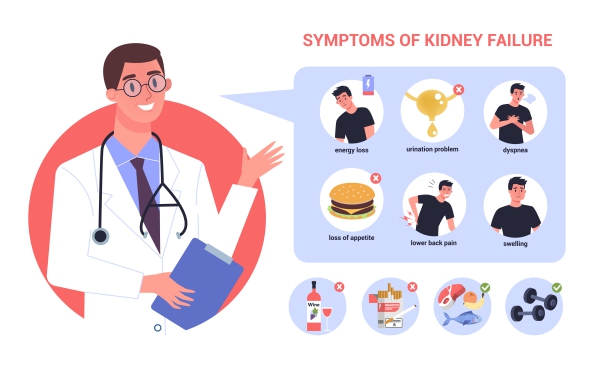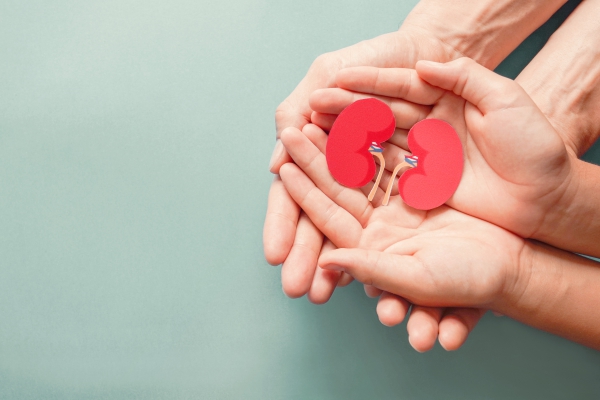Chronic Kidney Disease, Kidney failure, Loss of kidney function, Dialysis, Renal disease
Description : Chronic kidney disease, also known as chronic kidney failure, is when there is progressive and
Article Details :
What is chronic kidney disease?
Chronic kidney disease, also known as chronic kidney failure, is when there is progressive and irreversible damage to your kidney gradually leading to a complete loss of function of your organ. This usually follows a slow progression occurring over a period of years. At initial stages, chronic kidney disease may not be apparent as your kidney is still able to compensate for the damage present.
Your kidneys are responsible for a variety of functions, namely:
- Maintaining the balance of water, electrolytes, acids and bases in your body
- Excreting waste products accumulating in your body such as urea, creatinine and uric acid
- Retaining important substances required by your body such as glucose and amino acids
- Regulating some hormones such as erythropoietin, calcitriol and renin
If your kidney is damaged, these functions are impaired and will eventually lead to symptoms. This is due to the accumulation of waste products in your body, electrolyte imbalance and excessive levels of fluid accumulating in the body. The symptoms arise when your kidney is severely impaired.
According to the National Institute of Diabetes and Digestive and Kidney diseases (NIDDK), one in ten American adults have some degree of chronic kidney disease. Its prevalence has also been shown to increase with increasing age. The main goal of the treatment of chronic kidney disease is to stop or slow down the progress, finding and treating the underlying cause.
Causes of Chronic kidney disease
There are several diseases known to be the underlying cause of chronic kidney disease. The mechanism behind is that these diseases cause injury to the delicate structures found in the kidney called nephrons. These are responsible to filter blood in order to eliminate waste products from your body. Damage to the nephrons eventually lead to kidney disease.
Chronic kidney disease can arise as a result of:
- High blood pressure: Increased blood pressure can lead to damage to the filtering units present in your kidney.
- Type 1 or type 2 diabetes: Uncontrolled diabetes can lead to an excessive accumulation of glucose in your blood. When the blood passes through the nephron to be filtrated, the excess blood sugar causes injury in your kidney.
- Polycystic kidney disease
- Glomerulonephritis: which is an inflammation of your kidneys.
- Obstruction of the urinary tract: When this occurs, urine from your bladder flows back to your kidney. This causes an increased pressure in your kidney and eventually leads to damage.
- Certain toxins: fuels, solvents and lead for example.
- Autoimmune diseases: such as systemic lupus erythematosus whereby your own body attacks the cells in your kidneys.
- Recurrent kidney infections also known as pyelonephritis.
Risk factors
There are factors that can make you more prone to develop chronic kidney disease. These include:
- Increasing age
- Having a close family member with kidney diseases
- High blood pressure
- Urinary tract infections
- Smoking
- Obesity
- Type 1 and 2 diabetes
- Kidney infections
- Kidney stones
- Kidney structure abnormalities
Signs and symptoms
Chronic kidney disease follows a slow and progressive course compared to acute kidney disease in which symptoms appear and deteriorate rapidly.
There are many signs and symptoms which can be present in chronic kidney disease and these include:
- Blood in urine
- Dark urine
- Decreased urine productions
- Puffy and swollen feet, ankles and hands
- Swelling around the eyes
- Lack of energy
- High blood pressure
- Itchy skin
- Difficulty to sleep at night
- Anaemia
- Loss of appetite
- Nausea and vomiting
- Erectile dysfunction
- Shortness of breath
- Drowsiness
- Loss of weight
The above symptoms do not occur only in chronic kidney disease. They can also arise in a variety of other diseases. It is very important to recognise these symptoms and carry out necessary tests in order to confirm the diagnosis. An early diagnosis can improve your chance of survival.

Making a diagnosis
To diagnose chronic kidney disease, your doctor will first start by taking a proper history to ask you more about your symptoms. This is usually followed by a thorough physical examination to look for signs of the condition. However, it is important that tests are carried out to confirm the diagnosis in order to initiate treatment. These tests may include:
- Blood tests: This should be done to check for the level of waste products in your bloodstream. This can reveal whether your kidneys are not functioning properly leading to an accumulation of waste materials in your body. These include urea and creatinine. Electrolyte levels can also be checked through blood tests. Complete blood counts are done to check for the presence of Read more



